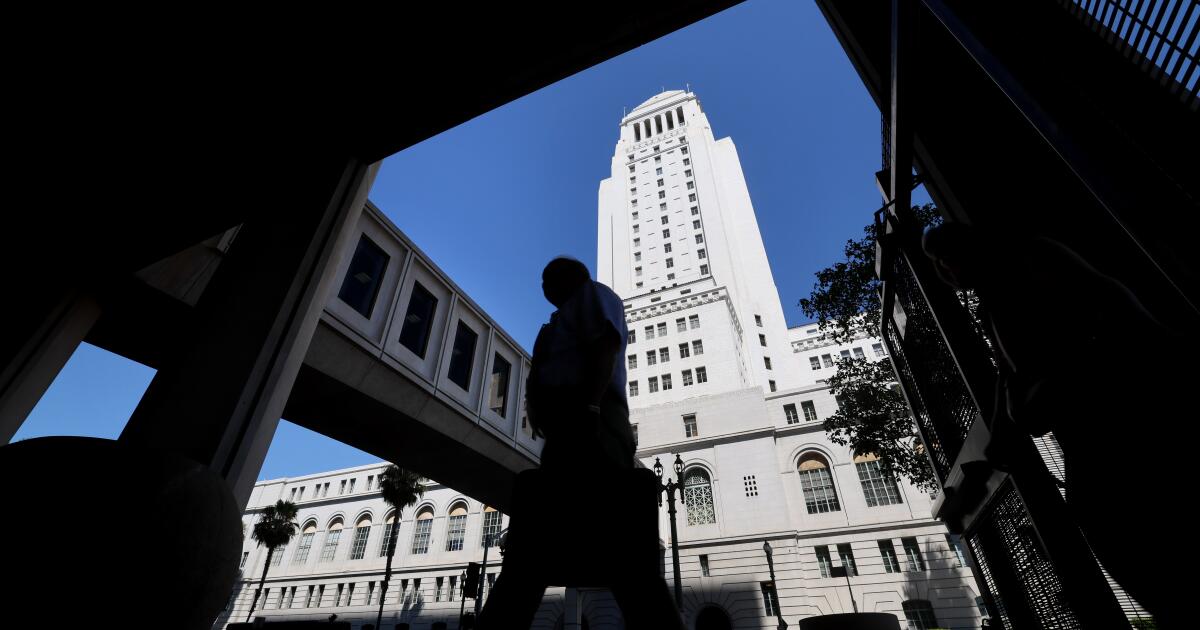Meet the McOskers: How one South Bay family wields power at City Hall
As Los Angeles city officials worked on an agreement to modernize the Convention Center, more than one member of the McOsker family was playing a key role.
City Councilmember Tim McOsker supported the $2.6-billion expansion, which could bring more tourism but threatens to further exacerbate Los Angeles’ dire fiscal situation.
Nella McOsker, his daughter, runs the Central City Assn., an influential downtown Los Angeles business group, which advocated strenuously for the project.
And his nephew, Emmett McOsker, who was an aide to former Mayor Eric Garcetti, works for the Tourism Department — handling the Convention Center.
Central City Assn. President and Chief Executive Nella McOsker.
(Juliana Yamada/Los Angeles Times)
Nella McOsker often argued for the project as her father listened with his council colleagues. In September, he cast a “yes” vote.
“It’s just a family tradition of public service,” said Doane Liu, executive director of the Tourism Department, who is a longtime friend and former colleague of Tim McOsker — and Emmett McOsker’s boss. “I wish there were more McOskers working at City Hall.”
And there are. Flying a little beneath the radar, due to her last name, is a fourth family member, Anissa Raja — the councilmember’s niece (cousin to Emmett and Nella), who is also his legislative director and president of the Los Angeles County Young Democrats.
Raja does not lead with the fact that she is the councilmember’s relative.
“I don’t mention it because I’m a staffer. I keep it professional at work,” she said.
While the interplay between McOskers can create potential conflicts of interest, Nella says she logs every lobbying conversation she has with Tim’s office to the city’s Ethics Commission, just like she does with other councilmembers.
Plus, she and her dad often disagree. And in L.A. city government, lobbying a close family member is perfectly legal, as long as neither party has a financial stake.
“As a city, we made a policy decision that it shouldn’t be just because you’re related to someone that you can’t try to exert influence over them if they’re in an elected position,” said Jessica Levinson, a professor of law at Loyola Marymount University and former head of the city’s Ethics Commission.
Councilmember Tim McOsker speaking during a 2023 meeting at City Hall.
(Jay L. Clendenin/Los Angeles Times)
For decades, the McOskers — a large, tight-knit Irish Catholic family from San Pedro — have wielded power at Los Angeles City Hall. Unlike the Garcettis and the Hahns, the McOskers have not served in citywide or countywide elected office. But their breadth of influence in Los Angeles politics over the last quarter century may be unparalleled.
The McOskers are hardly alone in making city politics the family business.
There’s Councilmember Katy Yaroslavsky, whose father-in-law Zev Yaroslavsky once held her seat. And Herb Wesson, the former council speaker, whose son was his aide and whose daughter-in-law Alexis Wesson is chief of staff to Councilmember Adrin Nazarian.
Sometimes that leads to family members bumping up against each other in questionable ways.
Eric Garcetti’s father, Gil Garcetti — perhaps best known for being L.A. County district attorney during the O.J. Simpson trial — was president of the Ethics Commission when his son was on the City Council. That led to issues in 2006, when Gil inadvertently contributed to Eric’s reelection campaign, which was not allowed. Or consider Councilmember Curren Price, who has been charged with allegedly voting in favor of development projects his wife’s company was being paid to consult for.
The McOskers’ tradition of city service predates Tim, who worked for City Attorney James Hahn in the 1990s before becoming Hahn’s chief of staff when Hahn was mayor in the early 2000s. Tim’s father, Mac, was a city firefighter, which many in the family cite as the origin of the public service bug.
To this day, the family is as much, or more of, a fire family than a politics family — and some members have combined the two.
Tim’s brother Patrick is a retired LAFD engineer who served as president of United Firefighters of Los Angeles City, the powerful firefighters union. Another brother, Mike, who died in 2019, was vice president of the same union.
Emmett, Patrick’s son, said his father was always his hero and that he wanted to be a firefighter. But when he graduated college in 2011 following the Great Recession, the fire department wasn’t hiring, so he got into politics instead.
Tim, too, aspired to be a firefighter at one point. Two of his children are firefighters, one for LAFD and the other for the California Department of Forestry and Fire Protection, while a cousin works for the county fire department.
In 2003, then-Councilmember Janice Hahn — sister of Mayor James Hahn and daughter of longtime county supervisor Kenneth Hahn — told The Times that Tim and his brothers Patrick, Mike and John (then vice president of the city’s Harbor Area Planning Commission) “are involved in everything.”
Rebecca Liu Morales, a former aide to then-Councilmember Eric Garcetti, was Nella McOsker’s close childhood friend in San Pedro.
“We grew up super familiar with public life and what it looks like. We were dragged to campaign events. We spent Saturdays volunteering,” said Liu Morales, who as Doane Liu’s daughter was also raised in a political family.
Little did Nella McOsker know that decades down the line, she would still be attending her father’s campaign events, helping him get elected to the City Council in 2022.
She worked as his operations director, referring to herself as his “Ego Killer” for always being willing to knock him down a peg. The campaign was filled out by volunteers from the family, from Tim’s wife, Connie, to brother Patrick, who was an avid doorknocker.
One politico who lives in the district noted that two McOskers separately knocked on his door and a third called him as part of a phone banking operation.
After Tim won his council seat, Nella took a job running the Central City Assn. Now, she lobbies councilmembers, including her father’s office.
Councilmember McOsker, along with Councilmember Yaroslavsky, proposed a law in 2023 that would have required lobbyists like Nella who are close relatives of councilmembers or high-level council staffers to disclose the relationship. They would have been prohibited from lobbying on land use development projects in that councilmember’s district. Because Nella works on issues involving downtown, not the San Pedro area, she and Tim would likely not have been affected. The law was never passed.
Rob Quan, who runs a transparency-focused good government advocacy group,
said there is no evidence that the McOskers have leveraged their relationships for undue advantage.
Tim said the family rarely talks local politics at dinners and holidays. First off, there are so many of them that the atmosphere can become chaotic.
Last time he hosted Thanksgiving, Tim said about 47 people showed up, and the tables stretched all the way outside onto the back patio. Mostly, they dote on the kids, and cousins reconnect.
“It’s not a lot about politics. It’s a lot about family,” Tim said.
When politics do come up, the McOskers often land on opposite sides.
Tim said he disagreed with his firefighter daughter Miranda and his brother Patrick, who believed LAFD Chief Kristin Crowley should have been reinstated after Mayor Karen Bass ousted her over her handling of the Palisades fire. The two showed up with other firefighters at the council chambers when the council was voting on the issue.
“You can’t have a mayor and a chief of fire … on different pages. It is dangerous,” Tim said.
While Tim and Nella both supported the Convention Center expansion, the two have split on other issues.
Earlier this year, Tim voted to increase the hotel and airport worker minimum wage — which Nella and the Central City Assn. fiercely opposed.
“There’s a different intensity I can get to with him [than with other councilmembers],” she said, referring to her conversations with her father about politics.
This summer, Nella McOsker and the Central City Assn. were part of a business coalition that proposed a ballot measure to repeal the city’s gross receipts tax on businesses, which generates about $800 million for the city annually. Her goal was to help struggling businesses by reducing their taxes.
“Terrible idea,” Tim McOsker said.
That was probably the most annoyed “Tim” got with her, Nella said.
She calls him Tim, not Dad — partially out of decorum in a world where she is lobbying him and his colleagues on a regular basis.
It’s also how she and her four younger siblings grew up — they’ve always called their parents Tim and Connie.
Nella’s son Omero is 4. She says he can be whatever he wants when he grows up, but some in the city family already have their eyes on him.
“I’m ready to offer him an internship,” Liu said.

